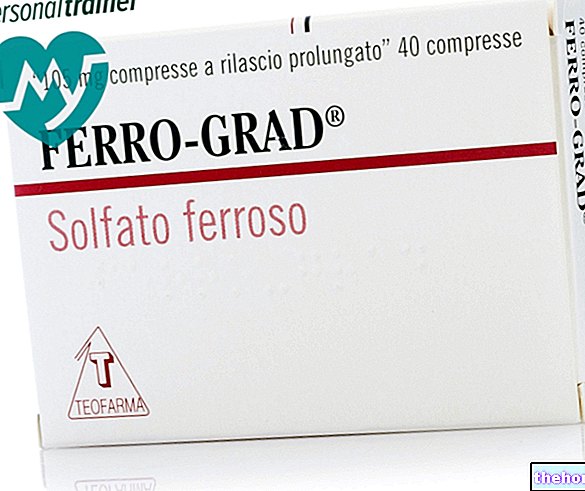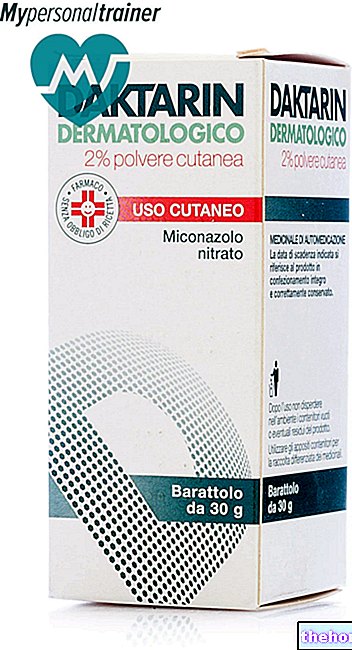Active ingredients: Ibuprofen
BUSCOFENACT 400 mg soft capsules
Why is Buscofenact used? What is it for?
BuscofenAct contains the active substance ibuprofen, which belongs to a class of drugs called non-steroidal anti-inflammatory drugs (NSAIDs). NSAIDs relieve ailments by changing the body's response to pain and fever.
BuscofenAct is indicated for the symptomatic treatment of:
- mild to moderate pain such as headache, toothache and menstrual pain;
- fever and pain associated with the common cold.
BuscofenAct is indicated in adults and adolescents weighing more than 40 kg (12 years and older). Talk to your doctor if you do not feel better or if you feel worse after 3 days of treatment in case of fever or after 4 days if you have taken the medicine for the treatment of pain.
Contraindications When Buscofenact should not be used
Do not take BuscofenAct
- if you are allergic (hypersensitive) to ibuprofen or any of the other ingredients of this medicine (listed in section 6);
- if you have ever suffered from shortness of breath, asthma, runny nose, swelling or hives after using acetylsalicylic acid (known as aspirin) or other similar pain relievers (NSAIDs);
- if you have (or have had two or more episodes of) stomach ulcer or bleeding;
- if you have had a history of gastrointestinal bleeding or perforation related to previous NSAID therapy;
- if you suffer from severe liver, kidney or heart failure;
- if you suffer from cerebrovascular haemorrhages, or other haemorrhages;
- if you suffer from haematological disorders of unknown origin;
- if you are severely dehydrated (from vomiting, diarrhea or low fluid intake);
- if you are in the last trimester of pregnancy;
- do not use BuscofenAct in adolescents with body weight <40 kg and in children due to the high content of active ingredient.
Precautions for use What you need to know before taking Buscofenact
Talk to your doctor or pharmacist before taking BuscofenAct:
- if you have or have suffered from asthma or allergic diseases as shortness of breath may occur;
- if you have liver problems;
- if you have reduced kidney function. There is a risk of renal impairment in dehydrated adolescents.
- if you have or have ever had intestinal disease (ulcerative colitis or Crohn's disease);
- if you have heart problems or a history of stroke or think you may be at risk for these conditions (for example if you have high blood pressure, diabetes or high cholesterol levels or if you are a smoker), you should discuss your treatment with your doctor or pharmacist;
- if you suffer from certain skin conditions (Systemic Lupus Erythematosus (SLE), or a mixed connective tissue disease). If you suffer from severe skin reactions such as exfoliative dermatitis, Stevens-Johnson syndrome and toxic epidermal necrolysis. The use of BuscofenAct should be stopped immediately at the first appearance of a rash, mucosal lesions or any other sign of an allergic reaction;
- if you have any inherited disease related to the production of blood cells (acute intermittent porphyria);
- if you have had "high blood pressure and / or" heart failure;
- if you have had major surgery;
- if you suffer from hay fever, nasal polyps or chronic obstructive respiratory disease as there is an increased risk of allergic reactions in such cases. Allergic reactions can manifest themselves with asthma attacks (the so-called "analgesic asthma"), Quincke's edema or urticaria;
- during a chickenpox infection it is advisable to avoid the use of BuscofenAct;
- Medicines such as BuscofenAct may be associated with a modest increased risk of heart attack ('myocardial infarction') or stroke. Any risk is more likely with high doses and prolonged treatments.Do not exceed the recommended dose or duration of treatment (3 days if you have a fever and 4 days for pain treatment);
- if you suffer from bleeding disorders;
- in cases of prolonged administration of BuscofenAct, periodic monitoring of hepatic function, renal function, blood count is necessary;
- Concomitant use of NSAIDs, including specific cyclo-oxygenase-2 inhibitors, increases the risk of adverse reactions (see section "Taking BuscofenAct with other medicinal products") and should be avoided.
These side effects can be minimized by using the lowest effective dose for the shortest treatment period. Older people are at higher risk for side effects.
In general, habitual use of analgesics can lead to severe permanent kidney problems. This risk can be increased under physical exertion associated with salt loss and dehydration. Therefore this should be avoided.
Prolonged use of any type of pain reliever for headache can lead to worsening of the headache. If this occurs or is suspected, you should notify your doctor and discontinue treatment.
The diagnosis of drug overuse headache (MOH) should be suspected in patients with frequent or daily headaches despite (or because of) regular use of headache medications.
If you think any of the above apply to you, consult your doctor before using BuscofenAct.
Interactions Which drugs or foods can modify the effect of Buscofenact
Tell your doctor or pharmacist if you are taking or have recently taken any other medicines, including medicines obtained without a prescription.
What should you avoid when taking other medicines?
Some drugs such as anticoagulants (against clotting) (for example acetylsalicylic acid, warfarin, ticlopidine), drugs for high blood pressure (ACE inhibitors for example. Captopril, beta blockers, angiotensin II antagonists), and also other medicines may influence or be affected by treatment with ibuprofen.
Therefore always ask your doctor for advice before using ibuprofen together with other medicines.
In particular, tell your doctor or pharmacist if you are taking:
Acetylsalicylic acid or other NSAIDs (anti-inflammatories and analgesics) as they may increase the risk of gastrointestinal ulcers or bleeding;
Digoxin (for heart failure) as the effect of digoxin can be enhanced;
Glucocorticoids (drugs containing cortisone or cortisone-like substances) as it may increase the risk of gastrointestinal ulcers or bleeding
Antiplatelet agents as it can increase the risk of bleeding;
Acetylsalicylic acid (low dose) as the effect on platelet aggregation may be impaired;
Anticoagulants (such as warfarin) as ibuprofen can potentiate the effects of these drugs;
Phenytoin (for epilepsy) as the effect of phenytoin can be enhanced;
Selective serotonin reuptake inhibitors (drugs used for depression) as they can increase the risk of gastrointestinal bleeding;
Lithium (a drug for manic depressive and depression) since the effect of lithium can be enhanced;
Probenecid and sulfinpyrazone (drugs for gout) since the excretion of ibuprofen can be delayed;
High blood pressure medications and diuretics as ibuprofen may decrease the effects of these medications and there may be an increased risk to the kidney;
Potassium-sparing diuretics as they can lead to hyperkalaemia;
Methotrexate (a drug for cancer or rheumatism) since the effect of methotrexate can be enhanced;
Tacrolimus and cyclosporines (immunosuppressive drugs) as kidney damage can occur;
Zidovudine (a medicine to treat HIV / AIDS) as the use of BuscofenAct may increase the risk of joint bleeding or swelling in HIV positive haemophiliacs;
Sulfonylureas (antidiabetic drugs) as there may be possible interactions; as the risk of seizures may be increased.
Taking BuscofenAct with food and drink
Take the capsules with water. Patients with gastric problems are recommended to take BuscofenAct on a full stomach. If taken shortly after eating, the onset of the effect of BuscofenAct may be delayed. If this happens, do not take BuscofenAct more than recommended in the section "How to take BuscofenAct" or until the correct interval between doses has elapsed.
Some undesirable effects, such as those affecting the gastrointestinal system, may occur more during the concomitant intake of alcohol and BuscofenAct.
Warnings It is important to know that:
Pregnancy and breastfeeding
Tell your doctor if you are pregnant while taking BuscofenAct. Do not take this drug in the last 3 months of pregnancy. Avoid using this drug in the first 6 months of pregnancy unless your doctor advises otherwise.
The drug passes into breast milk but can be used during breastfeeding if used at the recommended dose and for the shortest time possible.
The product belongs to a class of medicines (NSAIDs) which can impair fertility in women. This effect is reversible upon discontinuation of the drug.
If you are pregnant or breast-feeding, think you may be pregnant or are planning to have a baby, ask your doctor or pharmacist for advice before taking this medicine.
Driving and using machines
When used for short-term treatment and at a normal dosage, this drug has no or negligible effect on the ability to drive and use machines. BuscofenAct contains sorbitol If you have been told by your doctor that you have an "intolerance to some sugars, contact your doctor before taking this medicinal product.
Dosage and method of use How to use Buscofenact: Dosage
Always take this medicine exactly as described in this leaflet or as directed by your doctor or pharmacist. If in doubt, consult your doctor or pharmacist.
Unless otherwise prescribed by your doctor, the standard dose is:
Adults and adolescents with body weight> 40 kg (aged 12 years and over):
Initial dose: take 400 mg of ibuprofen (1 soft capsule); if necessary, take an additional 400 mg dose of ibuprofen (1 soft capsule), but do not exceed the total dose of 1200 mg of ibuprofen (3 soft capsules) in 24 hours.
The interval between doses should not be less than 6 hours.
Consult your doctor or pharmacist if you feel that the effect of this drug is greater or less than expected.
Use in children and adolescents
BuscofenAct is contraindicated in adolescents with body weight
Method of administration
For oral use.
The capsules must not be chewed.
Duration of treatment
For short-term treatment only.
If you need to take BuscofenAct for more than 3 days in case of fever or for more than 4 days for pain treatment or if your symptoms get worse, consult your doctor.
Overdose What to do if you have taken too much Buscofenact
If you take more BuscofenAct than you should
Consult your doctor or pharmacist immediately.
The following symptoms may occur: nausea, vomiting, stomach pain, headache, dizziness and sleepiness. Rarely: low blood pressure and loss of consciousness (myoclonic seizures in children), reduced breathing (respiratory depression) and blue discoloration of the skin and mucous membranes (cyanosis).
If you have any further questions on the use of this product, ask your doctor or pharmacist.
Side Effects What are the side effects of Buscofenact
Like all medicines, this medicine can cause side effects, although not everybody gets them. If you experience any of the following known side effects of NSAIDs or if you are unsure stop taking this drug and consult your doctor as soon as possible. Elderly patients are at increased risk of developing problems associated with side effects.
Stop taking BuscofenAct immediately and tell your doctor if you have any of the following conditions, which may be signs of serious adverse events:
- severe stomach problems, heartburn or abdominal pain;
- vomit containing blood similar to coffee grounds;
- black stools or blood in the urine;
- skin reactions, such as itchy rashes;
- difficulty in breathing and / or swelling in the face or throat;
- fatigue associated with loss of appetite;
- sore throat, associated with mouth ulcers, fatigue and fever;
- profuse nosebleeds and skin bleeding;
- abnormal fatigue associated with impaired urine output;
- swelling of the face, feet or legs; - chest pain.
Tell your doctor if you experience any of the following side effects, if they get worse or if you notice any side effects not listed.
Frequency common (may affect up to 1 in 10 people)
- heartburn, abdominal pain, nausea and indigestion, vomiting, flatulence, diarrhea, constipation, and slight bleeding in the stomach and / or intestines which can cause anemia in exceptional cases.
Frequency uncommon (may affect up to 1 in 100 people)
- stomach or intestinal ulcers, sometimes with bleeding and perforation, inflammation of the lining of the mouth with ulcers (ulcerative stomatitis), inflammation of the stomach (gastritis), worsening of colitis and Crohn's disease;
- headache, dizziness, sleeplessness, agitation, irritability or tiredness;
- visual disturbances;
- allergic reactions, such as skin rashes, itching and asthma attacks. Stop taking BuscofenAct and tell your doctor immediately.
Frequency rare (may affect up to 1 in 1000 people)
- tinnitus (ringing in the ears);
- kidney damage (papillary necrosis) and high concentrations of uric acid in the blood.
Very rare (may affect up to 1 in 10,000 people)
- swelling (edema), high blood pressure (hypertension) and heart failure have been reported in association with NSAID treatment;
- inflammation of the esophagus or pancreas, formation of narrowing in the small and large intestine (in the form of diaphragmatic and intestinal strictures);
- severe skin infections and soft tissue complications occurred during chickenpox infection;
- lower than normal urine output and swelling (especially in patients with high blood pressure or reduced kidney function), swelling (edema) and cloudy urine (nephrotic syndrome), inflammatory kidney disease (interstitial nephritis) which can lead to acute kidney failure. If any of the above symptoms occur or if you feel generally unwell, stop taking BuscofenAct and consult your doctor immediately, as these may be the first signs of kidney damage or kidney failure;
- disturbances in the production of blood cells - the first signs are: fever, sore throat, superficial mouth ulcers, flu-like symptoms, severe tiredness, nasal and skin bleeding. In these cases, you must stop treatment immediately and consult your doctor. No treatment with painkillers or antipyretics should be undertaken on one's own initiative;
- psychotic reactions and depression;
- Worsening of infections associated with infections (eg necrotizing fasciitis) has been observed in conjunction with the use of certain pain relievers (NSAIDs). If signs of an infection occur or worsen while using BuscofenAct, you should consult the doctor should be evaluated immediately whether to resort to antibiotic therapy;
- hypertension (high blood pressure), palpitations, heart failure, heart attack;
- liver dysfunction (a first sign may be yellowing of the skin), liver damage, especially during long-term treatment, liver failure, acute inflammation of the liver (acute hepatitis);
- Symptoms of aseptic meningitis with neck stiffness, headache, nausea, vomiting, fever, blurred consciousness have been observed with the use of ibuprofen. Patients with autoimmune diseases (SLE, mixed connective tissue disease) may be more predisposed Contact your doctor immediately if you experience these symptoms;
- severe forms of skin reactions, such as rash with redness and blistering (such as Steven-Johnson syndrome, toxic epidermal necrolysis, Lyell's syndrome), hair loss (alopecia);
- severe generalized hypersensitivity reactions. Medicines such as BuscofenAct may be associated with a small increased risk of heart attack ('myocardial infarction') or stroke.
Reporting of side effects
If you get any side effects, talk to your doctor or pharmacist. This includes any possible side effects not listed in this leaflet. You can also report side effects directly via the national reporting system at http://www.agenziafarmaco.gov.it/it/responsabili. By reporting side effects you can help provide more information on the safety of this medicine.
Expiry and Retention
Keep this medicine out of the sight and reach of children.
Do not use this medicine after the expiry date which is stated on the carton.
The expiry date refers to the last day of that month.
This medicine does not require any special storage conditions.
Do not throw away any medicines via wastewater or household waste.
Ask your pharmacist how to throw away medicines you no longer use. This will help protect the environment.
Composition and pharmaceutical form
What BuscofenAct
The active ingredient is ibuprofen.
One soft capsule contains 400 mg of ibuprofen.
The excipients are:
Contents of the capsules
Macrogol 600
Potassium hydroxide
Purified water
Capsule shell:
Jelly
Sorbitol
Purified water
Printing ink
Ingredients of Opacode WB black NS-78-17821:
Black iron oxide (E172)
Propylene glycol (E1520)
Hypromellose 6cP
Description of the appearance of BuscofenAct and contents of the pack
BuscofenAct is a clear, light yellow, oval shaped soft gelatin capsule, 16-18mm in length, with the "B400" logo printed in black ink.
BuscofenAct is available in blister packs consisting of triplex (PVC / PE / PVDC) and aluminum.
Packs of 6 and 12 capsules.
Not all pack sizes may be marketed.
Source Package Leaflet: AIFA (Italian Medicines Agency). Content published in January 2016. The information present may not be up-to-date.
To have access to the most up-to-date version, it is advisable to access the AIFA (Italian Medicines Agency) website. Disclaimer and useful information.
01.0 NAME OF THE MEDICINAL PRODUCT
BUSCOFENACT 400 MG SOFT CAPSULES
02.0 QUALITATIVE AND QUANTITATIVE COMPOSITION
One soft capsule contains 400 mg of ibuprofen.
Excipients:
Sorbitol 95.94 mg / capsule.
For the full list of excipients, see section 6.1.
03.0 PHARMACEUTICAL FORM
Soft capsules.
Clear, light yellow, oval shaped soft gelatin capsules, 16-18mm in length, with "B400" logo printed in black ink.
04.0 CLINICAL INFORMATION
04.1 Therapeutic indications
Symptomatic treatment of:
- mild to moderate pain such as headache, toothache and menstrual pain;
- fever and pain associated with the common cold.
BuscofenAct is indicated in adults and adolescents weighing more than 40 kg (aged 12 years and over).
04.2 Posology and method of administration
Dosage
Adults and adolescents with body weight> 40 kg (12 years of age and older): starting dose of 400 mg of ibuprofen.
If necessary, an "additional 400 mg dose of ibuprofen." Can be taken. The interval between doses should be based on the symptoms observed and the maximum recommended daily dose, and should not be less than 6 hours. take more than 1200 mg of ibuprofen in 24 hours.
For short-term treatments only.
If BuscofenAct soft capsules are to be taken for more than 3 days in case of fever or for more than 4 days for pain treatment or if symptoms worsen, the patient is advised to consult their doctor.
It is recommended to take on a full stomach for people with gastric disorders.
If taken shortly after eating, the onset of the effect of BuscofenAct may be delayed.
If this happens, do not take BuscofenAct more than recommended in section 4.2 (posology) or until the correct interval between doses has elapsed.
Particular patient populations
Senior citizens
No particular dosage adjustments are required. Due to possible undesirable effects (see section 4.4), elderly subjects should be carefully monitored.
Kidney failure
No special dosage adjustments are required in patients with mild or moderate renal impairment (for patients with severe renal impairment, see section 4.3).
Hepatic insufficiency (see section 5.2)
No special dosage adjustments are required in patients with mild or moderate hepatic impairment (for patients with severe hepatic dysfunction, see section 4.3).
Pediatric population
BuscofenAct is contraindicated in adolescents weighing less than 40 kg and in children due to the high content of the active substance (see section 4.3). If use of the medicinal product is necessary for more than 3 days in adolescents, or in case of worsening of symptoms, the doctor should be consulted.
Method of administration
For oral use.
The soft capsules should not be chewed.
04.3 Contraindications
BuscofenAct soft capsules are contraindicated in patients with:
- hypersensitivity to ibuprofen or to any of the excipients listed in section 6.1;
- history of hypersensitivity (eg bronchospasm, asthma, rhinitis, angioedema or urticaria) associated with the intake of acetylsalicylic acid or other non-steroidal anti-inflammatory drugs (NSAIDs);
- haematological disorders of unknown origin;
- history of recurrent or ongoing peptic ulcer / haemorrhage (two or more distinct episodes of proven ulceration or bleeding);
- history of gastrointestinal bleeding or perforation related to previous NSAID therapy;
- cerebrovascular haemorrhage or other bleeding episodes;
- severe hepatic insufficiency, severe renal insufficiency or severe heart failure (see also section 4.4).
Third trimester of pregnancy (see section 4.6).
Adolescents with body weight below 40 kg and children.
In patients with severe dehydration (due to vomiting, diarrhea or insufficient fluid intake).
04.4 Special warnings and appropriate precautions for use
Undesirable effects can be minimized with the use of the lowest effective dose for the shortest possible duration of treatment required to achieve symptom control (see gastrointestinal and cardiovascular risks below).
Caution is warranted in patients with certain clinical conditions, which may worsen:
- Patients with systemic lupus erythematosus and various connective tissue disorders have an increased risk of developing aseptic meningitis (see section 4.8);
- congenital pathology of porphyrin metabolism (eg acute intermittent porphyria);
- gastrointestinal disorders and chronic inflammatory bowel diseases (ulcerative colitis, Crohn's disease) (see section 4.8);
- hypertension and / or cardiac impairment as renal function may deteriorate (see sections 4.3 and 4.8);
- renal impairment (see sections 4.3 and 4.8). In dehydrated adolescents there is a risk of
impaired renal function;
- hepatic failure (see sections 4.3 and 4.8);
- immediately after major surgical interventions;
- in patients who have allergic reactions to other substances, since for these patients there is a greater risk of hypersensitivity reactions occurring even after the use of BuscofenAct;
- in patients suffering from hay fever, nasal polyps or chronic obstructive diseases of the airways as there is a greater risk of allergic reactions for these patients. These reactions may present as asthma attacks (so-called analgesic asthma), Quincke's edema or urticaria.
Gastrointestinal effects
The use of BuscofenAct soft capsules in combination with other NSAIDs, including selective cyclooxygenase-2 inhibitors, increases the risk of adverse reactions and should be avoided.
Senior citizens
Elderly subjects have a higher frequency of adverse reactions to NSAIDs, especially gastrointestinal bleeding and perforation, which can be fatal (see section 4.2).
Gastrointestinal bleeding, ulceration or perforation
Gastrointestinal bleeding, ulceration or perforation, sometimes fatal, have been reported at any stage of treatment with the use of all NSAIDs, with or without prodromal symptoms or a previous history of gastrointestinal events.
If gastrointestinal bleeding or ulceration occurs in patients taking ibuprofen, treatment should be discontinued.
The risk of gastrointestinal bleeding, ulceration or perforation increases with higher doses of NSAIDs, in patients with a history of ulcer, particularly if complicated with haemorrhage or perforation (see section 4.3), and in elderly patients. These patients should start treatment with the lowest available dose. Concomitant therapy with protective agents (e.g. misoprostol or proton pump inhibitors) should be considered for these patients and also for patients taking concomitantly low doses of acetylsalicylic acid or other drugs that may increase the risk of gastrointestinal events. (see below and section 4.5).
Patients with a history of gastrointestinal toxicity, particularly the elderly, should report any unusual abdominal symptoms (especially gastrointestinal bleeding), especially in the early stages of treatment.
Caution should be exercised in patients being treated concomitantly with drugs that may increase the risk of ulceration or bleeding, such as oral corticosteroids, anticoagulants such as warfarin, selective serotonin reuptake inhibitors or antiplatelet agents such as acetylsalicylic acid (see section 4.5).
NSAIDs should be administered with caution to patients with a history of gastrointestinal disease (ulcerative colitis, Crohn's disease) as their condition may worsen (see section 4.8).
Skin reactions
Serious skin reactions, some of them fatal, including exfoliative dermatitis, Stevens-Johnson syndrome and toxic epidermal necrolysis, have been reported very rarely in association with the use of NSAIDs (see section 4.8). Patients appear to be at increased risk for these reactions in the early stages of therapy; in fact, in most cases, the reaction occurs in the first month of treatment. Administration of BuscofenAct soft capsules should be discontinued at the first appearance of skin rash, mucosal lesions or any other sign of hypersensitivity .
Exceptionally, chickenpox can be at the origin of serious skin infections and complications affecting the soft tissues. Until now, it has not been possible to exclude that NSAIDs contribute to the worsening of these infections.
It is therefore recommended not to use BuscofenAct soft capsules in the course of chickenpox.
Cardiovascular and cerebrovascular effects
Caution is required before initiating treatment in patients with a history of hypertension and / or heart failure, as fluid retention, hypertension and edema have been reported in association with NSAID therapy. Patients with uncontrolled hypertension, congestive heart failure, established ischemic heart disease, peripheral arterial disease and / or cerebrovascular disease should only be treated with ibuprofen after careful consideration. Similar considerations should be made before initiating long-term treatment in patients with risk factors for cardiovascular disease (eg, hypertension, hyperlipidaemia, diabetes mellitus, or smoking).
Clinical studies and epidemiological data suggest that the use of ibuprofen, especially at high doses (2400 mg per day) and for long-term treatment, may be associated with a modest increased risk of arterial thrombotic events (eg myocardial infarction or stroke). Overall, epidemiological studies do not suggest that low dose ibuprofen (eg ≤ 1200 mg per day) is associated with an increased risk of myocardial infarction.
Other warnings and precautions
Severe acute hypersensitivity reactions (eg anaphylactic shock) have been observed very rarely.
At the first signs of a hypersensitivity reaction following the intake / administration of BuscofenAct soft capsules, therapy should be discontinued. Required medical measures should be carried out by experienced personnel.
Ibuprofen, the active substance in BuscofenAct soft capsules, may temporarily inhibit platelet function (platelet aggregation). Therefore, patients with platelet disorders should be carefully monitored.
In case of prolonged treatment with ibuprofen, the liver and kidney parameters as well as the blood picture should be checked regularly.
Prolonged use of any pain reliever for headache can make it worse. If this occurs or is suspected, you should consult your doctor and discontinue treatment.
The diagnosis of drug overuse headache (MOH) should be suspected in patients with frequent or daily headaches despite (or because of) regular use of headache medications. In general, habitual use of analgesics, in general Particularly the combination of different analgesic active ingredients can lead to permanent renal lesions with the risk of renal insufficiency (analgesic nephropathy). This risk can be increased under physical exertion associated with salt loss and dehydration. Therefore this must be avoided. .
In case of concomitant alcohol intake during the use of NSAIDs, adverse events related to the active substance, especially those affecting the gastrointestinal tract or central nervous system, may increase.
BuscofenAct contains sorbitol. Patients with rare hereditary problems of fructose intolerance should not take this medicine.
04.5 Interactions with other medicinal products and other forms of interaction
04.6 Pregnancy and lactation
Pregnancy
Inhibition of prostaglandin synthesis may adversely affect pregnancy and / or embryo / fetal development. Results of epidemiological studies raise concerns about an increased risk of spontaneous abortion, cardiac malformations and gastroschisis after use of an inhibitor. of prostaglandin synthesis in early pregnancy. The absolute risk of cardiovascular malformations increased from less than 1% to approximately 1.5%. The risk is believed to increase with increasing dose and duration of therapy.
In animals, administration of a prostaglandin synthesis inhibitor resulted in increased pre- and post-implantation loss and embryo-fetal mortality. Furthermore, an increased incidence of malformations, including cardiovascular malformations, has been reported in animals treated with a prostaglandin synthesis inhibitor during the period of organogenesis.
During the first and second trimester of pregnancy, ibuprofen should only be administered in case of absolute necessity. If ibuprofen is used in women intending to conceive or during the first and second trimester of pregnancy the dose should be kept as long as possible. as low as possible and the duration of treatment should be as short as possible.
During the third trimester of pregnancy, all prostaglandin synthesis inhibitors can expose the fetus to the risk of:
- cardiopulmonary toxicity (with premature closure of the arterial duct and pulmonary hypertension);
- renal dysfunction, which can worsen up to renal failure with oligo-hydroamniosis.
At the end of pregnancy, the mother and the newborn to:
- possible prolongation of bleeding time, an antiplatelet effect that can occur even at very low doses;
- inhibition of uterine contractions which can result in a delay or prolongation of labor at the time of delivery.
Consequently, ibuprofen administration is contraindicated during the third trimester of pregnancy.
Feeding time
Ibuprofen and its metabolites may pass in low concentrations into breast milk. To date, no deleterious effects on infants are known. Therefore, for short-term treatment of pain and fever at the recommended dose, it should generally not breastfeeding may need to be stopped.
Fertility
There is some evidence that drugs that inhibit cyclo-oxygenase / prostaglandin synthesis may impair female fertility by affecting ovulation.
Once the ibuprofen treatment has ended, the effect is reversible.
04.7 Effects on ability to drive and use machines
As undesirable central nervous system effects such as tiredness and dizziness may occur following high-dose BuscofenAct, the ability to react quickly, the ability to drive and use machines may be impaired in isolated cases. This is especially true if the use of BuscofenAct is associated with the consumption of alcohol.
04.8 Undesirable effects
The list of undesirable effects below refers to all undesirable effects that have occurred during treatment with ibuprofen, including those seen during long-term and high-dose treatment in patients with rheumatic diseases.
The reported frequencies, which occur with higher incidence than very rare cases, refer to the "short-term use of daily doses up to a maximum of 1200 mg of ibuprofen for the oral dosage form and a maximum of 1800 mg for suppositories. .
It should be taken into account that the following undesirable effects are fundamentally dose-dependent and vary from individual to individual. The most commonly observed undesirable events are gastrointestinal in nature. Peptic ulcer, gastrointestinal perforation or haemorrhage may occur, including with fatal outcome, especially in the elderly (see section 4.4). Following administration, nausea, vomiting, diarrhea, flatulence, constipation, dyspepsia, abdominal pain, melaena, haematemesis, ulcerative stomatitis, aggravation of colitis and Crohn's disease have been reported (see section 4.4). Gastritis was observed less frequently. The risk of gastrointestinal bleeding depends on the dose and duration of treatment.
Edema, hypertension and heart failure have been reported in association with NSAID treatment.
Clinical studies and epidemiological data suggest that the use of ibuprofen, especially at high doses (2400 mg per day) and for long-term treatment, may be associated with a slightly increased risk of arterial thrombotic events (eg heart attack. heart disease or stroke) (see section 4.4).
Note that within each frequency group undesirable effects were listed in descending order of severity.
Patients should be advised to stop taking BuscofenAct immediately and to consult their physician if a serious adverse reaction occurs.
Adverse reactions are listed below by system organ class, and by frequency, according to the following categories:
Very common (≥1 / 10)
Common (≥1 / 100,
Uncommon (≥1 / 1000,
Rare (≥ 1 / 10,000,
Very rare (
If necessary, patients should be adequately advised to discontinue BuscofenAct treatment and consult a physician immediately if any of the following occur:
- severe gastro-intestinal disorders, heartburn or abdominal pain;
- hematemesis;
- melaena or blood in the urine;
- skin reactions, such as itchy rashes;
- respiratory distress and / or edema of the face or larynx;
- fatigue associated with loss of appetite;
- sore throat, associated with aphthous ulcers, fatigue and fever;
- severe nosebleeds and skin bleeding;
- abnormal fatigue associated with reduced urinary excretion;
- edema in the feet or legs;
- chest pain.
Reporting of suspected adverse reactions
Reporting of suspected adverse reactions occurring after authorization of the medicinal product is important as it allows continuous monitoring of the benefit / risk balance of the medicinal product. Healthcare professionals are asked to report any suspected adverse reactions via the national reporting system. "address http://www.agenziafarmaco.gov.it/it/responsabili.
04.9 Overdose
Symptoms in case of overdose
Symptoms of overdose may manifest as central nervous system symptoms such as headache, dizziness, light-headedness and loss of consciousness (myoclonic seizures even in children), abdominal pain, nausea, vomiting, gastrointestinal bleeding, and liver and kidney dysfunction.
Hypotension, respiratory depression and cyanosis.
Therapeutic measures in case of overdose
There is no specific antidote.
If after one hour of ingestion, the patient has potentially toxic levels of the drug, resort to oral administration of activated charcoal.
05.0 PHARMACOLOGICAL PROPERTIES
05.1 Pharmacodynamic properties
Pharmacotherapeutic group: non-steroidal anti-inflammatory and antirheumatic drugs; derivatives of propionic acid, ATC code: M01AE01
Ibuprofen is a non-steroidal anti-inflammatory active ingredient (NSAID) which, in common experimental animal models of inflammation, has been shown to effectively inhibit the synthesis of prostaglandins. In humans, ibuprofen reduces pain of inflammatory origin, edema and fever. In addition, ibuprofen reversibly inhibits platelet aggregation induced by ADP and collagen.
Experimental data suggest that ibuprofen, when administered concomitantly, may inhibit the effect of low-dose acetylsalicylic acid on platelet aggregation. In one study, a decrease in the effect of acetylsalicylic acid on thromboxane formation and platelet aggregation was observed when a single 400 mg dose of ibuprofen was taken between 8 hours before or 30 minutes after administration of acetylsalicylic acid. (81 mg) immediate release.
However, the limitations of these data and the uncertainties regarding the extrapolation of the ex vivo data and their applicability to clinical situations, do not allow definitive conclusions to be drawn about the regular use of ibuprofen and no clinically relevant effect is considered likely following the "occasional use of ibuprofen.
05.2 Pharmacokinetic properties
Following oral administration, ibuprofen is absorbed partly in the stomach and then completely in the small intestine.
Following hepatic metabolism (hydroxylation, carboxylation), the pharmacologically inactive metabolites are completely eliminated, mainly via the kidneys (90%), but also with the bile.
The elimination half-life in healthy subjects, and in patients with renal and hepatic disease is 1.8-3.5 hours. The plasma protein binding is approximately 99%.
Following oral administration of a normal-release pharmaceutical form (tablet) of ibuprofen, maximum plasma concentrations are reached after 1-2 hours. However, ibuprofen is absorbed more rapidly from the gastrointestinal tract after oral administration of BuscofenAct soft capsules than traditional tablets. In a fasting pharmacokinetic study, the maximum plasma concentrations (median Tmax) of one tablet of acid ibuprofen were reached after 75 minutes versus 45 minutes observed for BuscofenAct soft capsules, respectively.
05.3 Preclinical safety data
In animal studies, the subchronic and chronic toxicity of ibuprofen was mainly characterized by lesions and ulcerations in the gastrointestinal tract.
Education in vitro And in vivo did not provide clinically relevant evidence of the potential mutagenic effect of ibuprofen.
Studies in rats and mice did not reveal any carcinogenic effects of ibuprofen. Ibuprofen inhibited ovulation in rabbits and caused implantation difficulties in various animal species (rabbit, rat, mouse). Experimental studies have shown that the " ibuprofen crosses the placenta.
06.0 PHARMACEUTICAL INFORMATION
06.1 Excipients
Capsule content:
Macrogol 600
Potassium hydroxide
Purified water
Capsule shell :
Jelly
Liquid sorbitol
Purified water
Printing ink
Ingredients of Opacode WB black NS-78-17821:
Black iron oxide (E172)
Propylene glycol (E1520)
Hypromellose 6cP
06.2 Incompatibility
Not relevant.
06.3 Period of validity
2 years
06.4 Special precautions for storage
This medicinal product does not require any special storage temperatures.
06.5 Nature of the immediate packaging and contents of the package
Triplex (PVC / PE / PVDC) and aluminum blisters.
Packaging:
6 capsules
12 capsules
Not all pack sizes may be marketed.
06.6 Instructions for use and handling
Unused medicine and waste derived from this medicine must be disposed of in accordance with local regulations.
07.0 MARKETING AUTHORIZATION HOLDER
Boehringer Ingelheim International GmbH
Binger Strasse 173 D55216 Ingelheim Am Rhein
Germany (DE)
08.0 MARKETING AUTHORIZATION NUMBER
Box of 6 soft capsules 041631019
Pack of 12 soft capsules 041631021
09.0 DATE OF FIRST AUTHORIZATION OR RENEWAL OF THE AUTHORIZATION
10.05.2012
10.0 DATE OF REVISION OF THE TEXT
9 September 2014




























